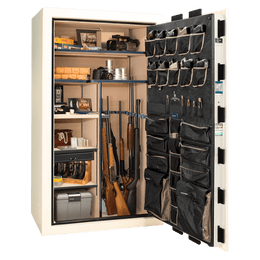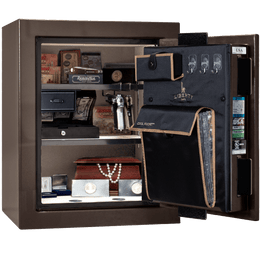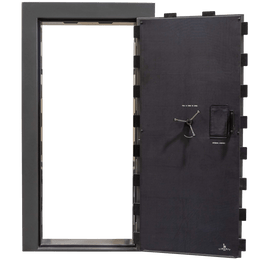When discussing most topics related to firearms, it’s tempting to ask, “What’s the best home defense firearm?” A reasonable response is almost always, “Best for what?” Even when discussing appropriate choices for a home-defense firearm, it’s not possible for someone to give you a best recommendation without a few caveats.
Everyone’s individual needs and wants are different, and everyone operates under different skill sets, budgets, physical/mental abilities, and even legal considerations that can have a dramatic impact on what choice may be right for them in their unique situation.
Table of Contents
- Advantages of a handgun for home defense.
- Disadvantages of a handgun for home defense.
- Advantages of a shotgun for home defense.
- Disadvantages of a shotgun for home defense.
- Advantages of a rifle for home defense.
- Disadvantages of a rifle for home defense
- Whatever you choose, keep it secure in a Liberty Safe.
However, what we can do is go over the distinct advantages of both handguns, shotguns, and rifles when considering their use as potential home-defense firearms, and help create more awareness of the potential advantages and disadvantages of each, so you may hopefully make a more informed decision.
Advantages of a Handgun for Home Defense
Size, Weight, and Portability
A handgun’s relatively small size and weight means that it’s easy to keep close at hand, carry on your person at all times, and even conceal if appropriate and legal in your area. Having a handgun on your person or readily available at all times when you’re home means that it’s there if and when you need it. This is much harder to do with a shotgun.
Inexpensive, Secure Handgun Storage
When you’re not in direct control of your home defense handgun, you should keep it securely locked up. Luckily, there are many options for relatively inexpensive, secure handgun storage, including Liberty’s handgun vaults.
Handguns are Relatively Easy to Learn and Operate
Handguns, particularly revolvers and today’s striker-fired pistols, are easy to understand. Some only have two or three main controls that allow safe loading, unloading, and firing. This is advantageous in cases where a person may not have time or interest in regular practice with a firearm (which is always a good idea, of course).
In addition, there are several handgun models today that were specifically designed to be simple and easy for individuals with less hand strength to load and operate safely. Shotguns, while they may be simple to use in some cases, are usually large and relatively heavy.
Handguns Generally Have Low Recoil and Muzzle Blast
While there are certainly some handguns that kick like a mule and have ferocious muzzle blast, they are generally not chosen as home-defense handguns. An appropriate handgun choice for most home-defense scenarios will have easily manageable recoil, and it won’t make your ears bleed when firing it indoors (be aware, however, that shooting ANY firearm in your home without hearing protection will probably be the loudest sound you’ve ever heard).
Handguns are Relatively Inexpensive (with some caveats)
Today’s selection of reliable, inexpensive handguns is far more diverse and extensive than even 20 years ago. There are multiple options for any type, size, and action you might desire, in any price range. For the price, it’s amazing what quality $400 (or less) can buy you on today’s handgun market.
A high-quality shotgun, on the other hand, is usually a much more expensive proposition. Some pump or break-action shotguns can be inexpensive, but they have some other potential issues, which we’ll discuss below.
Handguns are Comparatively Reliable
Today’s modern handgun designs are much more reliable and tolerant of a lack of maintenance than handguns of old. Though you should definitely keep your home defense handgun clean, maintained, and properly lubricated, a modern pistol or revolver is generally able to properly function even if you neglect it.
Disadvantages of a Handgun for Home Defense
Now that we’ve gone over some of the key advantages of a handgun for home defense, let’s go over some potential downsides to consider.
It’s more difficult to hit a target with a handgun when you’re under stress
It may seem second-nature to people who shoot handguns a lot to hit a target or multiple targets rapidly, but when you compare apples to apples with equally skilled shooters, a long gun is easier to aim and hit targets with due to the additional points of contact with the support hand, cheek weld, and shoulder.
Regular training and practice with your home-defense handgun can improve your abilities, but again, a long gun has inherent advantages in this regard.
Handguns are less effective at stopping a threat quickly
When comparing stopping power and effectiveness against a threat, there are really two categories: 1) handguns, and 2) shotguns/rifles. There’s so much difference in muzzle energy and terminal ballistics between the two categories that it’s almost silly to compare them.
The smaller size of handguns means a greater potential for theft, or even loss
The same small size and portability that makes handguns an attractive option for home defense also means that they have a greater potential to be stolen without attracting attention, or even lost in your home somewhere (hey, it has happened!).
Advantages of a Shotgun for Home Defense
Now let’s go over some of the advantages of a shotgun for home defense when compared to a handgun.
A shotgun is more powerful and effective against threats
As noted above, when talking about the stopping power of firearms, there are handguns, and then there are long guns. A shotgun with modern defensive ammunition is devastatingly effective against human-sized threats.
Shotguns are easier to aim
Since a defensive shotgun is aimed (yes, you have to aim your home-defense shotgun) with firm contact against the buttpad, cheekpiece, grip, and forend, it’s a much more stable and accurate platform. Novice or unpracticed shooters almost always find it easier to hit targets with long arms compared to handguns, when comparing the same targets at the same distances.
The great versatility of shotgun ammunition
Shotguns are probably the most versatile firearms overall, with available ammunition tailored to nearly any possible use. You can select your cartridge based on outright stopping power, or penetration (or lack thereof) through barriers, or recoil characteristics, or pattern density, or multiple other factors.
Intimidation factor
This is always a tricky subject, since “intimidating” someone with a firearm is illegal. However, when a potential threat sees you with your 12-gauge shotgun pointing at them, it may be more of an inherent deterrent than seeing you with a tiny pocket pistol. Both firearms have the potential to save your life, but a reasonable person will agree that the shotgun is probably more “threatening” to a potential attacker.
Shotguns have more widespread legality in restricted locales
Something that must be discussed is the fact that handguns have been severely restricted or banned completely in certain jurisdictions, while shotguns are usually legal to own and possess in your home. (Always check your local laws and regulations.)
Disadvantages of a Shotgun for Home Defense
Shotguns are relatively large and heavy
Compared to a handgun, a shotgun is generally much larger and heavier. This can be an important consideration for smaller-statured individuals or those with less physical strength.
Shotguns are relatively difficult to learn and use
When compared to the simpler handguns, most defensive shotguns are more complicated to load, unload, and use safely. The unlocking/release mechanism can be very counterintuitive for newer or untrained shooters, and user-induced malfunctions are very common.
Shotguns have heavier recoil
The greatly increased effectiveness of shotguns on a threat comes with greatly increased recoil to the user. There are “reduced recoil” defensive loads available, but even those will seem quite strong to newer or weaker shooters.
Shotguns are difficult to store in a way that’s both very secure and very accessible
While a quick-access handgun vault is relatively inexpensive, shotguns are more difficult to keep secure while also keeping them very accessible for immediate need. There are several options but each has potential issues.
Misconceptions about “you don’t need to aim a shotgun”
A common “old wives’ tale” about shotguns is “you don’t even need to aim!” Nothing could be further from the truth. At home-defense distances, even a cylinder-bore shotgun’s pattern will typically be no larger than a paper plate, and usually more like a softball. This is a good thing, actually, because you are responsible for every projectile that exits your defensive firearm, and you want all of the shotgun pellets to hit your attacker.
But shotguns aren’t some mythical blaster that you can hip-fire and level a wide swath in front of you. You definitely need to aim your defensive shotgun if you want to actually hit your target.
For more information, please read our article: Why use a shotgun for home defense?
Shotguns are comparatively unreliable
We imagine some of you are sputtering in disbelief, but statistically shotguns are less reliable than handguns. Add in the complexity of use and the ubiquity of user-induced malfunctions among less-trained users, and a home defense shotgun can be quite problematic.
Anyone selecting a shotgun, particularly a pump-action shotgun, for home defense should maintain a rigorous familiarity and practice regimen with all potential users.
Shotguns are relatively expensive (with caveats)
While there are some very inexpensive options for defensive shotguns, they often have quality-control or reliability issues that must be ironed out before they are suitably reliable for home defensive use. A high-quality, reliable, semi-automatic defensive shotgun is a fine choice for home use, but they are generally about double the cost (or more) of a similarly reliable handgun.
Advantages of a rifle for home defense
We’ve gone over the pros and cons of handguns and shotguns in a home-defense role, but what about rifles? Let’s go over some of the advantages of a rifle for home defense when compared to a handgun or shotgun.
RIFLES ARE EXTREMELY POWERFUL AND EFFECTIVE AGAINST HUMAN OR ANIMAL ATTACKERS
As noted above, when talking about the stopping power of firearms, there are handguns, and then there are long guns. A rifle that fires high-speed rifle cartridges (some rifles fire handgun cartridges) is extremely effective against human-sized threats. There’s a reason that the rifle has been the primary infantry weapon of every national military for 170+ years. Even with full-metal-jacket (FMJ) projectiles, a common .223/5.56 caliber AR-15 type rifle creates devastating wounds due to the bullets yawing/tumbling and fragmenting when they hit soft tissue. In some jurisdictions, hollow-point or expanding projectiles may be prohibited, and the speed, tumbling, and fragmentation of a high-speed rifle projectile can make up for any lack of expansion.
RIFLES CAN DEFEAT SOME SOFT BODY ARMOR
It’s a growing trend for bad guys, particularly breaking-and-entering or home-invasion crews, to wear body armor and/or armor plates. While rifle bullets may not defeat a home invader wearing a plate carrier and hard armor plates if you shoot him where he’s covered by plates, high-speed rifle rounds such as the common 5.56x45 NATO (AR-15) will often penetrate through most types of soft body armor, particularly the cheaper stuff. Additionally, repeated hits to hard-plate body armor with a rifle will often make it through.
RIFLES ARE EASIER TO AIM AND GET ACCURATE HITS WITH
Compared to a handgun, a rifle is much easier to aim and hit accurately. Since you have 4 points of contact with the rifle (buttpad, cheek weld, firing hand, support hand) it’s possible to be very steady and accurate with minimal training.
RIFLES ARE FAR MORE ACCURATE AT A DISTANCE
It’s unlikely in most people’s home-defense scenarios that they will need to be taking shots at more than about 7-10 yards. However, that eventuality is a possibility, particularly for social breakdown, civil unrest, or rural defense situations. If this potentially applies to you, a rifle is pretty much the only logical choice for defense beyond about 50 yards or so. A typical “home defense” rifle such as an AR or AK type is accurate out to 300 yards with open sights or 1X red dot optics in trained hands and out to 600 yards with magnified optics. If your home defense scenario potentially includes defending your loved ones or property at any significant distance, a good rifle is in your future.
RIFLES ARE LOUD
This “advantage” point may be controversial, but there are some advocates of rifles for home defense that say you shouldn’t use sound suppressors. Why? Because the horrendous muzzle blast of a rifle is in itself a potential deterrent to bad actors. If you’ve ever fired a rifle indoors during a competition or otherwise, you know that the noise and concussion are intense. This may be a signal for home invaders to get the heck outta Dodge.
RIFLES MAY BE LEGAL WHERE HANDGUNS ARE NOT
Similarly to shotguns, rifles–at least typical “hunting rifles”–are often legal to own and keep in your residence even in places where the possession of handguns has been restricted or banned. In some cases, rifles are not allowed to have scary features like pistol grips or flash hiders, but in those locales, a more “hunting-oriented” rifle that is for all intents and purposes identical in function to a scary black rifle may still be legal. (Always check your local laws and regulations.)
RIFLES ARE EASIER TO LEARN TO LOAD AND SHOOT THAN MOST SHOTGUNS
We said above that shotguns can be relatively difficult to learn and use compared to handguns, particularly tube-fed shotguns (the most common type of repeating defense-oriented shotgun). However, the most common type of defensive rifle in America (AR-15) is very easy to load, unload, and use compared to most defensive shotguns.
DEPENDING ON THE BULLET SELECTED, RIFLES CAN HELP PREVENT OVERPENETRATION
An AR-15 or similar rifle with expanding/self-defense bullets can be less dangerous to innocent bystanders due to overpenetration compared to handguns or common 00 buckshot shotgun rounds. In some cases, all of the rifle projectile’s energy is expended inside the intended target, and there’s no overpenetration through walls or into potential bystanders. Again, careful bullet selection is key. Here’s a good demonstration of this.
DISADVANTAGES OF A RIFLE FOR HOME DEFENSE
RIFLES ARE LOUD
Yep, this is a disadvantage as much as it is an advantage (as seen above). The concussion and noise of a high-powered rifle fired indoors, even with hearing protection in place, can be truly disorienting and can shock your nervous system. It’s certainly scary for the bad guys, but it’s also almost guaranteed to cause permanent hearing loss to you as well if you don’t have good earplugs or shooting muffs in place. Even with a suppressor, many rifles (particularly the shorter-barreled variety popular for home defense) are still not hearing-safe.
RIFLES ARE LONG
Compared to a handgun, a rifle is much longer and heavier. For people with less physical strength, or for firearm retention in a fight, this can be an important caveat to consider.
RIFLES HAVE GREATER POTENTIAL FOR OVERPENETRATION
Compared to a shotgun loaded with #4 buckshot or heavy birdshot, rifles penetrate more interior walls and present more potential danger to family members or innocent bystanders. This is more demonstrable with FMJ ammunition, but expanding “defensive” rifle bullets still easily penetrate at least three walls and maintain lethal energy on the other side, if they don’t hit a bad guy first.
RIFLES ARE DIFFICULT TO STORE IN A WAY THAT’S BOTH VERY SECURE AND VERY ACCESSIBLE
Like shotguns, keeping a rifle at hand and ready to go while still secure from unauthorized access is a lot more difficult than simply buying a handgun vault. There are several options but each has potential issues. You should never leave a firearm unsecured when it’s not in your direct control. A quick-access gun safe is a good idea, but may not be possible for everyone.
RIFLE MALFUNCTIONS CAN BE VERY DIFFICULT TO CLEAR
A quality AR-15 or AK can be extremely reliable, but when malfunctions occur, they can be more difficult to clear than common handgun malfunctions. A nasty case-over-bolt malfunction in an AR can put your rifle out of commission until you perform a complete teardown, and may require tools to remedy.
RELIABLE RIFLES CAN BE EXPENSIVE
Compared to a typical pump-action shotgun or a basic, well-reputed handgun, a reliable rifle may cost several hundred dollars more. While there are very inexpensive AR-type rifles on the market, in many cases they are not reliable enough for use when your life is on the line.
Whatever you choose, keep it secure in a Liberty Safe
Choosing the right firearm to defend your home and family is an intensely personal choice, and we hope this article was helpful in informing you of some of the factors that need to be considered.
Whatever you end up choosing as your home-defense firearm, you should keep it secure and safe when not in your direct control. We recommend our line of top-quality Liberty safes made in America, with American steel.
*Made in the U.S.A. from U.S. and Global Parts.







